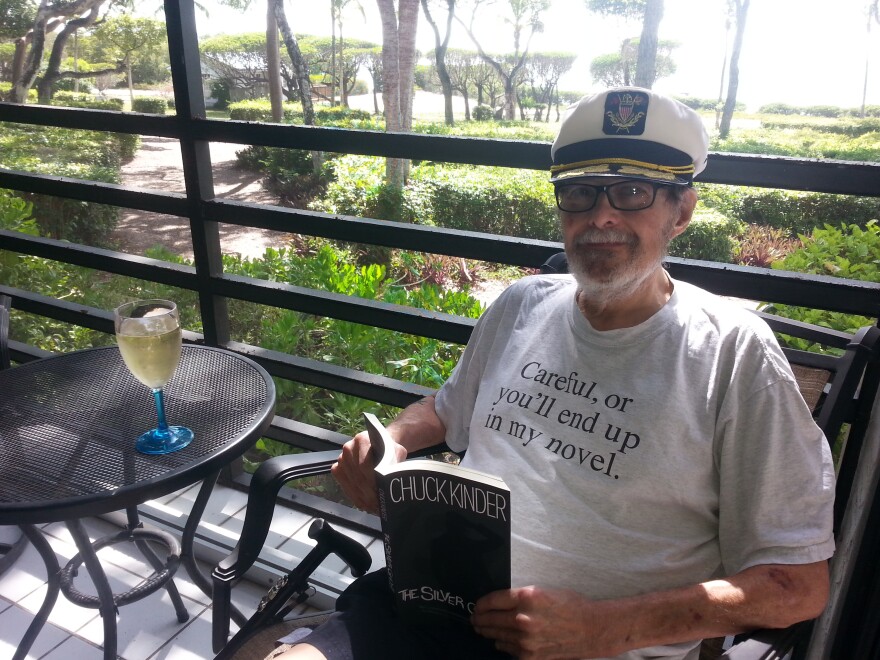Chuck Kinder was a widely known author whose novels got favorably reviewed in national publications.
But closer to home, Kinder was also a beloved, larger-than-life mentor to generations of aspiring writers. At the University of Pittsburgh, where he taught for nearly 35 years, Kinder’s best-known student was future Pulitzer Prize-winning author Michael Chabon, who based the English professor character in his novel “Wonder Boys” on Kinder.
Kinder, who retired from Pitt in 2014, died Friday in Miami. He was 76.
Among countless tributes on social media, Chabon called Kinder “my much-loved teacher, mentor and friend.” Writing on Instagram, Chabon, an undergraduate at Pitt in the early 1980s, added, “Almost forty years later I still write 1000 words a day because Chuck told me to.”
Kinder was born in Montgomery, W.V., in 1942. Throughout his life, he played up his Appalachian heritage, and not just in early novels like his 1973 debut, “Snakehunter,” and 1979’s “The Silver Ghost.” Friends recall that on first meeting people, he’d often playfully adopt a heavy West Virginia accent to see how they responded.
He studied at West Virginia University and in the 1970s did graduate work at Stanford University, where he befriended such future literary stars as Scott Turow and Raymond Carver. But he found his home at Pitt, which hired him as an English professor in 1980. The Squirrel Hill home Kinder shared with his wife, Diane Cecily, became an informal hub for students and local and visiting writers.
Kinder loved a good time; his 2001 novel “The Honeymooners: A Cautionary Tale,” a fictionalized version of his friendship with Carver, is full of carousing. And, as Chabon wrote on Instagram, "Wonder Boys" suggests “what a grand, epic-comic, inspiring, dazzling, legendary, thoroughly literary and larger-than-life figure he seemed to me in the days of my young writerhood.”
Kinder and Cecily’s parties were legendary; guests might include famed writers like Tobias Wolff. Robert Yune, a former graduate student of Kinder’s, recalled in a memorial Facebook post that even in the mid-2000s, when Kinder was in his 60s, at least one shindig lasted until 7 a.m.
“He wanted me to put on his gravestone, ‘The party has moved,’” said Cecily, his widow, in a phone interview from the couple’s home in Key Largo, Fla.
But Kinder was also a serious teacher. “He found no greater joy in life than in working with students,” said Cecily. She said he encouraged students to consider telling stories from different perspectives, or using different voices. “He taught them how to throw away the boundary that can really encumber your creative thinking, and really open it up,” she said.
“He was so genuinely excited about writing, about your work, about what you might do,” said Keely Bowers, who studied under Kinder both as an undergraduate and a graduate student. Bowers, who now teaches writing at Pitt and Carlow University, was one of several students over the years who rented the third-floor apartment in Kinder and Cecily’s house. “They were really like family to me,” she said.
The literary atmosphere blended seamlessly with the couple’s hospitality, she said: “There were always people. Their doors were open.”
Kinder selected his graduate students not only for their talent, but also with an eye toward how they would function as a group, for example in critiquing each other. “He had a gift for choosing people who would get along and challenge each other in workshop,” wrote Yune on Facebook, adding, “A number of my MFA classmates are still my closest friends.”
“The Honeymooners,” Kinder’s final novel, was the stuff of legend; he worked for years on the manuscript, which reportedly ballooned to 3,000 pages. (Chabon’s 1995 novel “Wonder Boys” — later a shot-in-Pittsburgh film starring Michael Douglas as Grady Tripp, the character loosely based on Kinder — was itself built around a vast, unfinished novel.) “Honeymooners,” much pared down, was published to in 2001 to strong reviews by critics including novelist Jay McInerney, writing in the New York Times.
Kinder’s other books included 2004’s “The Last Mountain Dancer,” a collection of nonfiction stories set in his native West Virginia, likewise admired for its vivid characters and lively prose.
In his final decade or so, Kinder survived a series of blows to his health including a heart attack, two strokes and triple-bypass surgery. He stopped writing fiction and turned to poetry, releasing several volumes through locally based indie publishers Low Ghost Press and Six Gallery Press.
Kinder retired in 2014. His retirement event at Pitt featured video tributes from the likes of Chabon and Turow.
That same year, he and Cecily moved permanently to Key Largo, where they had already been wintering, and where Kinder continued to fully indulge his fondness for rakish hats.
Cecily said his health declined notably this year. He died, she said, just an hour before the ambulance was to arrive at the hospital to take him home for hospice care.
Cecily said plans for a memorial service in Pittsburgh are pending.





